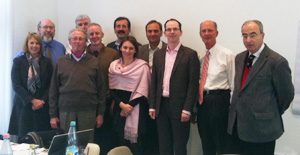Can we restore integrity to the financial sector?
November 29th, 2012
November 29th, 2012
Cross-posted from Transparency International’s Space for Transparency blog
 Integrity, trust and culture can seem like the most intangible and abstract of concepts in a hard-edged business environment – until they disappear. As the finance industry has discovered in recent years, failing to tend to a culture of integrity can cost you dearly. There are the record fines of course – such as those meted out to Goldman Sachs, Barclays and UBS – and they have grabbed most of the headlines. But there is also the incalculable reputational damage, which in the longer term can have a very tangible impact in terms of lost customers, investment and contracts.
Integrity, trust and culture can seem like the most intangible and abstract of concepts in a hard-edged business environment – until they disappear. As the finance industry has discovered in recent years, failing to tend to a culture of integrity can cost you dearly. There are the record fines of course – such as those meted out to Goldman Sachs, Barclays and UBS – and they have grabbed most of the headlines. But there is also the incalculable reputational damage, which in the longer term can have a very tangible impact in terms of lost customers, investment and contracts.
Sigmund Warburg understood this very well. A refugee from Nazi Germany, he arrived in London in the 1930s and made a career in what was then known as “merchant banking” (i.e. investment banking), becoming a dominant figure in the City in the post-war years. Warburg was a consistent advocate of “relationship banking”, a view of banking that emphasised the ethical framework that networks of capital needed to do their business properly. As he himself put it:
“The reputation of a banking firm for integrity, generosity and thorough service is its most important asset, more important than any financial item. Moreover, the reputation of a firm is like a very delicate living organism which can be easily damaged and which has to be taken care of incessantly, mainly being a matter of human behaviour and standards.”
How far financial firms have fallen short of these standards can be seen in the spate of recent money-laundering and index-rigging scandals. The trial of former UBS trader Kwaku Adeboli is also instructive. Despite attempts to portray the relatively junior employee as an isolated “rogue trader”, both the firm and its supervisors recognised a more pervasive problem. UBS has fired or suspended more than a dozen staff since the scandal first emerged. It has clawed back pay awards and reduced the bonus pool for the investment bank by three-fifths. On Monday, it received a STG 30 Million fine from the UK Financial Services Authority (one of the highest ever) for “significant control breakdowns” and the case itself has exposed numerous failures of management as well as a “more aggressive” attitude to pursuing revenue.
Such details indicate that a “transaction culture” – i.e. pursuit of short term revenues above all alse – seems to have prevailed over Warburg’s “trust culture”. There is a bitter irony here – Warburg’s firm merged with UBS in 1998.
We have seen examples of such corrosive cultures in other sectors and have many things to say on this subject to the finance industry. Indeed we have repeated this time and time again in recent months. However, as the magnitude of the problem has become apparent, we have decided that it is time to step up our action and engagement in this field.
Transparency International Financial Integrity Expert Panel
Last week, Transparency International convened the first meeting of a Financial Integrity expert group, whose mission will be to give shape to the actions we will take in this area in 2013. The group includes a number of individuals with banking and financial markets experience, both past and present, and contains an extraordinary breadth and depth of expertise that can be brought to bear on this issue. It will not only build on the diagnosis we outlined above, but will also examine how the finance industry has allowed itself to become a conduit for so much of the world’s dirty money – just one of the many alarming lapses in integrity that have become impossible to ignore.
In the coming months, the group will look at how, in practical terms, a culture of integrity can be instilled in financial institutions and how the flow of corrupt funds can be staunched. While they’re deliberating, why don’t you tell us what you think is the most urgent reform needed?